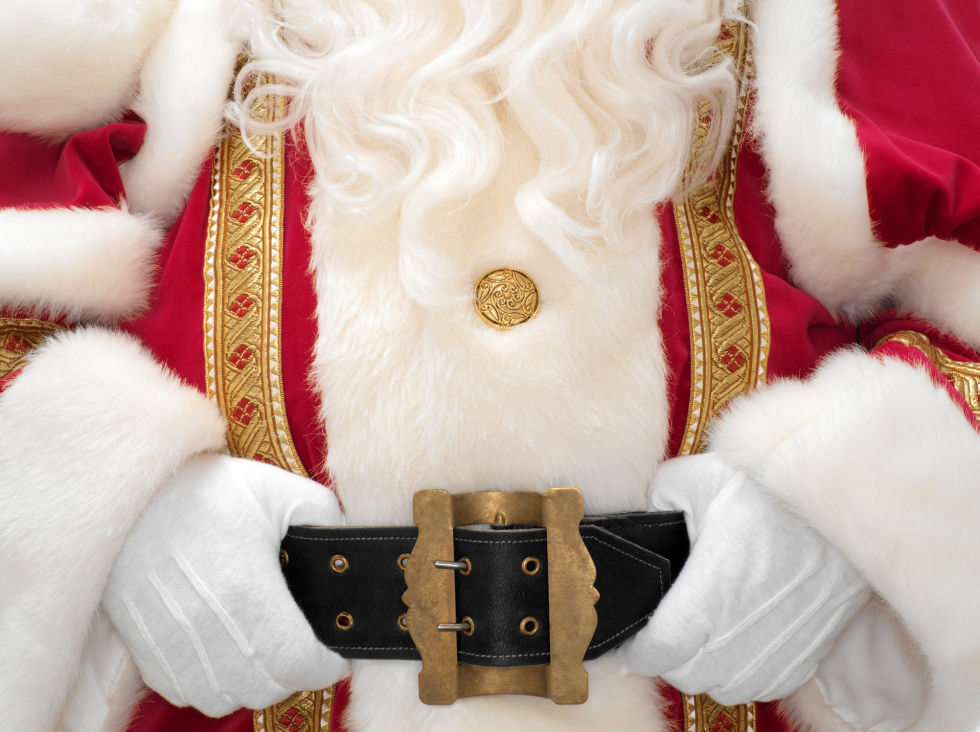Let’s face it: Christmas isn’t Christmas if you don’t end the day slumped on the sofa having changed into your pyjamas because you can’t deal with your jeans digging into your belly anymore.
And that’s usually thanks to being bloated (which, in turn, is thanks to the 377,292 roast potatoes you ate). But it can be uncomfortable, especially if you want to dress up and look nice, and don’t want to have to wear a giant bin bag in preparation for your stomach’s inevitable expansion.
To find out a little more about why we bloat so much over the festive period – and more importantly how we might be able to prevent it – we spoke to Dr Naila Arebi, Consultant Gastroentorologist at St Mark’s Hospital.
Why do we bloat during the Christmas period?
‘The most common cause of bloating is overindulgence,’ says Dr Naila, as we start having flashbacks to the entire Cadbury’s selection pack we single-handedly devoured in one day last year. And it’s particularly common this time of year because the foods we often choose are high in fat and sugar.
‘Excess fat slows the gut motility,’ explains the expert. ‘Their incompatibility with water makes fats resistant to the digestive process, and their arrival in your stomach triggers physiologic responses that delay gastric emptying.’
As well as that, the influx of sugar doesn’t help. ‘In addition, excess sugars ferment in the gut. This is not dissimilar to the fermentation process of champagne, in which sugars are added grape juice to cause bubbles. Slow gut function with excess fermentation contributes to bloating,’ Dr Naila says. And it actually makes total sense; we’re like one great big festive fizzy drink.
How can we avoid bloating at Christmas?
Unfortunately, there aren’t that many ways to avoid it unless you want to stick to the rigid #cleaneating you do for the rest of the year, and we all know how hard that can be with so much delicious food on offer. But the doctor does have a couple of bits of advice: ‘I would recommend limiting each meal to one sweet. In addition, try to opt for the lower fat content main dishes e.g. fish or turkey rather than lamb/beef or pork.’ Noted.
What Christmas foods trigger bloating?
‘If you’re a sufferer of IBS, certain foods can trigger symptoms in individuals, which would we recommend avoiding and/or limiting during Christmas,’ advises Dr Naila.
And for those who don’t have IBS but still bloat? ‘For others, the main reason we bloat during the festive period is because of the excess of food and drink, particularly if our body is not used to that type of diet. As mentioned, foods containing sugars and fats can lead to bloating. A roast dinner contains lots of fat and also is a large meal and therefore, this is why many of us feel extremely bloated following Christmas lunch. It might be wise to have less cream on your Christmas pudding and be sensible with the box of chocolates!’
What tips and tricks are there for preventing bloating when we still want to eat our body weight in food?
‘I would recommend avoiding eating a large volume of food in one sitting, as this can lead us to become uncomfortably full and bloat.’ So little and often it is, which suits me because that more or less means we can eat all day, right?
‘In addition, you can use antacids to minimise any heartburn,’ suggests the medical expert. ‘Antacids are medicines that counteract the acid in your stomach to relieve indigestion and heartburn. After a heavy meal try to follow with a light day of steamed vegetables and water. Treat this as a “detox day” after overindulging.’ But let’s be realistic here: we’ll probably need a detox month.
If already bloated, how can we ease it or help it go down?
‘A hot water bottle relieves discomfort,’ says Dr Naila, and we can totally get on board with the idea of that plus our new Christmas PJs. ‘Its heat and weight will help the gas leave your body and the pressure subside,’ she explains.
‘Trapped gas contributes to bloating and alternative cardiovascular exercise helps move this gas. Therefore try not to sit out of the family walk on Christmas day, as this could in fact help relieve your discomfort.’ And who doesn’t like a Christmas Day walk in the woods?
More of Dr Naila’s advice includes swapping ‘your Christmas evening tipple for peppermint tea as it can be very beneficial for your digestive system. Peppermint has relaxant and antispasmodic properties and can help reduce bloating by encouraging the release of gas’.
And on a slightly more serious note, Dr Naila says this:
‘It’s important to note that if bloating doesn’t subside it may be the sign of a more serious medical condition such as Inflammatory Bowel Disease or bowel cancer. Therefore, seek help if tummy problems persist past the Christmas period, particularly if there is blood in your faeces and you experience weight loss.’












